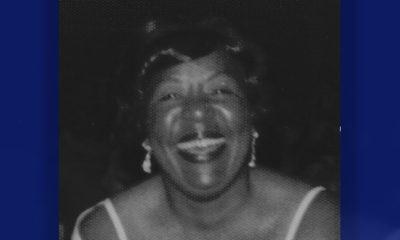Activism
Black LGBTQ+ Leaders and Allies Applaud 3 California Bills
Some of the proposed laws aim to address challenges that impact various segments of the African American LGBTQ+ community — either directly or circumstantially.

June is Pride Month and lawmakers in California are advancing a number of bills to make life safer and less difficult for people who are LGBTQ+.
Some of the proposed laws aim to address challenges that impact various segments of the African American LGBTQ+ community — either directly or circumstantially.
The first is Senate Bill (SB) 357. If the Legislature approves it, the law will repeal California Penal Code Section 653.22, which penalizes loitering with the intent to engage in sex work. This particular bill, if approved, supporters say will significantly reduce the risks and dangers many LGBTQ+ people at the lowest ends of the socioeconomic ladder face.
Many of them are young people who turn to sex work because of a number of reasons, including being unsupported by their families or the social structure because of their sexuality; trauma brought about by sexual or physical abuse; drug addiction; unemployment, among other factors.
Based on English Elizabethan “poor laws,” loitering laws in America were developed as a part of the Black Codes in the late 1800s as a means to arrest Black people in order to sell their labor in a practice called convict leasing.
“These laws were created to eradicate us,” said Dr. Jon Paul Higgins, a California-based social justice advocate and writer who is African American.
“So, when you talk about the importance of repealing these laws, it’s not even just about the law, it’s about getting to the root of what’s creating these laws,” Higgins explained.
According to the Centers for Disease Control, “many persons who exchange sex may have a history of homelessness, unemployment, incarceration, mental health issues, violence, emotional/physical/sexual abuse, and drug use.”
In California – and across the United States — a disproportionate number of African Americans are impacted by those challenges — all of them considered social determinants of good health by Public Health professionals.
Because of the vagueness of these loitering laws, many critics have noted that they gave police a wide range of arresting powers to target “undesirables” like Black people and people in the LGBTQ+ community, Higgins explained.
California State Senator Scott Wiener (D-San Francisco), author of this bill, says it would help make the streets safer for sex workers who are a part of a marginalized community.
“Sex workers are workers, and they deserve respect and safety,” Wiener said. “We must work toward a future where people — especially the most marginalized — aren’t criminalized because of who they are and what they look like. Anti-sex workers loitering laws are deeply pernicious, and they need to be repealed.”
SB 357 also allows those convicted of California Penal Code Section 653.22 to seal their records.
SB 357 was passed by the Senate Public Safety Committee 4-1 and has now been referred to the Assembly Appropriations Committee.
Another bill concerned with safety is Assembly Bill (AB) 1094, which would require the State Department of Public Health to establish a three-year pilot program in up to six participating counties to collect gender identity and sexual orientation data in violent death cases to get more accurate counts about hate crimes.
According to the Los Angeles County Commission on Human Relations 2019 Hate Crime Report, Black people accounted for 9% of the county’s population but 47% of the total racial hate crimes.
The report also stated that 2019 saw a 64% increase in hate crimes targeting trans people, many of whom were Black or Brown, according to the Human Rights Campaign.
“Yet another year with alarming levels of bias-motivated crimes underscores just how urgent it is to address this hate crimes epidemic,” said Alphonso David, Human Rights Campaign president. David is the first African American to lead the organization, the largest advocacy body for LGBTQ+ people and issues in the United States.
“This year, we saw a tragic new record of fatal violence against transgender and gender non-conforming people in this country, particularly against Black and Brown transgender women,” he said.
Following the Stonewall riots in New York, Black trans women like Marsha P. Johnson and Miss Major Griffin-Gracy became influential figures in the fight for LGBTQ+ rights at the time when discrimination and hate crimes against people like them were much more commonplace.
Assemblymember Joaquin Arambula (D-Fresno), author of AB 1094, explained why he feels the bill is crucial.
“I deeply appreciate the overwhelming support that my Assembly colleagues gave today to AB 1094,” Arambula said in a statement. “This legislation may be centered on data, but its purpose encompasses compassion and empathy to better understand what is happening in our LGTBQ+ community — particularly among the youth — when it comes to violent deaths, including homicide and suicide. AB 1094 is an important and humane step in ultimately preventing these deaths.”
AB 1094 has passed in the Assembly and is now on its way to the State Senate for consideration.
Senate Bill (SB) 379, which has now been referred to the Senate Appropriations Committee, would ensure the University of California Health System [UC Health] only contracts with healthcare facilities that provide LGBTQ-inclusive healthcare services, such as gender-affirming and reproductive care.
According to Blue Cross Blue Shield, Black mothers’ maternal mortality rate is 63% higher than white mothers while Black men are 70% more likely to die from a stroke as compared to non-Hispanic White men.
People in the LGBTQ+ community are less likely to have access to competent healthcare, largely due to issues with discrimination, according to Cigna.
Higgins spoke from personal experience about the intersectional nature of being both Black and in the LGBTQ+ community.
“For me, being a Black nonbinary person and meeting a provider who has all of these bias ideologies or stereotypes about Black people… there are all of these preconceived notions about who I am as a Black person and then you add on the nonbinary-slash-trans part of it, there’s just a lot of underlying stereotypes and bias,” Higgins said.
Jasmyne Cannick, founder and CEO of Empowerment Justice Strategies, praised this bill for moving with the tides of progress.
“In 2021, it makes absolute sense for UC Health to contract with healthcare facilities that provide LGBTQ-inclusive healthcare services given the population that it serves,” Cannick said.
“We are moving towards a more inclusive society, and these are the types of bills that will ensure that members of the LGBTQ+ community can receive healthcare they need,” she continued.
Higgins, Cannick and other advocates say it means a great deal that California lawmakers are making an effort to ensure that these “warriors” can continue to do so safely, and that those who just wish to live their lives without fear for being who they are may do so more boldly.
Activism
OP-ED: AB 1349 Puts Corporate Power Over Community
Since Ticketmaster and Live Nation merged in 2010, ticket prices have jumped more than 150 percent. Activities that once fit a family’s budget now take significant disposable income that most working families simply don’t have. The problem is compounded by a system that has tilted access toward the wealthy and white-collar workers. If you have a fancy credit card, you get “presale access,” and if you work in an office instead of a warehouse, you might be able to wait in an online queue to buy a ticket. Access now means privilege.

By Bishop Joseph Simmons, Senior Pastor, Greater St. Paul Baptist Church, Oakland
As a pastor, I believe in the power that a sense of community can have on improving people’s lives. Live events are one of the few places where people from different backgrounds and ages can share the same space and experience – where construction workers sit next to lawyers at a concert, and teenagers enjoy a basketball game with their grandparents. Yet, over the past decade, I’ve witnessed these experiences – the concerts, games, and cultural events where we gather – become increasingly unaffordable, and it is a shame.
These moments of connection matter as they form part of the fabric that holds communities together. But that fabric is fraying because of Ticketmaster/Live Nation’s unchecked control over access to live events. Unfortunately, AB 1349 would only further entrench their corporate power over our spaces.
Since Ticketmaster and Live Nation merged in 2010, ticket prices have jumped more than 150 percent. Activities that once fit a family’s budget now take significant disposable income that most working families simply don’t have. The problem is compounded by a system that has tilted access toward the wealthy and white-collar workers. If you have a fancy credit card, you get “presale access,” and if you work in an office instead of a warehouse, you might be able to wait in an online queue to buy a ticket. Access now means privilege.
Power over live events is concentrated in a single corporate entity, and this regime operates without transparency or accountability – much like a dictator. Ticketmaster controls 80 percent of first-sale tickets and nearly a third of resale tickets, but they still want more. More power, more control for Ticketmaster means higher prices and less access for consumers. It’s the agenda they are pushing nationally, with the help of former Trump political operatives, who are quietly trying to undo the antitrust lawsuit launched against Ticketmaster/Live Nation under President Biden’s DOJ.
That’s why I’m deeply concerned about AB 1349 in its current form. Rather than reining in Ticketmaster’s power, the bill risks strengthening it, aligning with Trump. AB 1349 gives Ticketmaster the ability to control a consumer’s ticket forever by granting Ticketmaster’s regime new powers in state law to prevent consumers from reselling or giving away their tickets. It also creates new pathways for Ticketmaster to discriminate and retaliate against consumers who choose to shop around for the best service and fees on resale platforms that aren’t yet controlled by Ticketmaster. These provisions are anti-consumer and anti-democratic.
California has an opportunity to stand with consumers, to demand transparency, and to restore genuine competition in this industry. But that requires legislation developed with input from the community and faith leaders, not proposals backed by the very company causing the harm.
Will our laws reflect fairness, inclusion, and accountability? Or will we let corporate interests tighten their grip on spaces that should belong to everyone? I, for one, support the former and encourage the California Legislature to reject AB 1349 outright or amend it to remove any provisions that expand Ticketmaster’s control. I also urge community members to contact their representatives and advocate for accessible, inclusive live events for all Californians. Let’s work together to ensure these gathering spaces remain open and welcoming to everyone, regardless of income or background.
Activism
Oakland Post: Week of December 31, 2025 – January 6, 2026
The printed Weekly Edition of the Oakland Post: Week of – December 31, 2025 – January 6, 2026

To enlarge your view of this issue, use the slider, magnifying glass icon or full page icon in the lower right corner of the browser window.
Activism
Big God Ministry Gives Away Toys in Marin City
Pastor Hall also gave a message of encouragement to the crowd, thanking Jesus for the “best year of their lives.” He asked each of the children what they wanted to be when they grow up.

By Godfrey Lee
Big God Ministries, pastored by David Hall, gave toys to the children in Marin City on Monday, Dec. 15, on the lawn near the corner of Drake Avenue and Donahue Street.
Pastor Hall also gave a message of encouragement to the crowd, thanking Jesus for the “best year of their lives.” He asked each of the children what they wanted to be when they grew up.
Around 75 parents and children were there to receive the presents, which consisted mainly of Gideon Bibles, Cat in the Hat pillows, Barbie dolls, Tonka trucks, and Lego building sets.
A half dozen volunteers from the Big God Ministry, including Donnie Roary, helped to set up the tables for the toy giveaway. The worship music was sung by Ruby Friedman, Keri Carpenter, and Jake Monaghan, who also played the accordion.
Big God Ministries meets on Sundays at 10 a.m. at the Mill Valley Community Center, 180 Camino Alto, Mill Valley, CA Their phone number is (415) 797-2567.
-

 Activism4 weeks ago
Activism4 weeks agoDesmond Gumbs — Visionary Founder, Mentor, and Builder of Opportunity
-

 Activism4 weeks ago
Activism4 weeks agoFamilies Across the U.S. Are Facing an ‘Affordability Crisis,’ Says United Way Bay Area
-

 Alameda County4 weeks ago
Alameda County4 weeks agoOakland Council Expands Citywide Security Cameras Despite Major Opposition
-

 Alameda County4 weeks ago
Alameda County4 weeks agoBling It On: Holiday Lights Brighten Dark Nights All Around the Bay
-

 Activism4 weeks ago
Activism4 weeks agoBlack Arts Movement Business District Named New Cultural District in California
-

 Activism4 weeks ago
Activism4 weeks agoLu Lu’s House is Not Just Toying Around with the Community
-

 Activism4 weeks ago
Activism4 weeks agoOakland Post: Week of December 17 – 23, 2025
-

 Black History3 weeks ago
Black History3 weeks agoAlfred Cralle: Inventor of the Ice Cream Scoop




















































